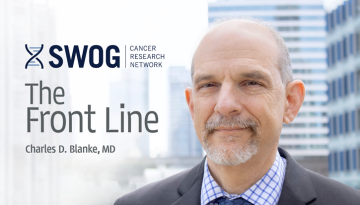Rad Oncs Poised to Progress in Precision Era
Medical oncology entered the precision medicine era some time ago, with the advent of genomic tumor testing and the parallel development of targeted treatments. Radiation oncologists were focusing (no pun intended) on beam delivery method - but they have not had a single evidence-based genomic test available to guide patient selection.
This is all in evolution.
Dr. Wendy Woodward has just published SWOG Cancer Research Network study results that show that the 21-gene recurrence score test used to guide chemotherapy treatment for post-surgery breast cancer patients may also help in choosing to administer radiation therapy. Study results suggest patients with an intermediate or high recurrence score are more likely to see their cancer return to the breast and nearby lymph nodes and, thus, could benefit from radiation.
The findings appear in JAMA Oncology. And, not surprisingly, they’re attracting attention from news outlets like The ASCO Post.
As a radiation oncologist, Dr. Woodward is ready for the precision revolution to begin. As she says in our press release: “For a decade, radiation oncologists have been banging on the doors of precision medicine, looking for genomic tools they can use to personalize treatment for their patients. We want these tools because they can help our patients. Radiation treatment can help wipe out local disease, saving or lengthening a patient’s life. And omitting radiation treatment could spare patients pain, time, and cost.”
What is particularly exciting to me is that SWOG and our partners in the NCTN are driving this innovation.
The Canadian Cancer Trials Group, in collaboration with the NCTN, is enrolling patients on TAILOR RT, a trial that will confirm whether the recurrence score – all by itself – can identify low risk node positive patients who do not need radiation therapy. TAILOR RT could change the standard of cancer care. The trial launched in 2018 and is expected to finish in 2027.
Until those data are in, our SWOG findings provide evidence that the recurrence score can be an effective, additional tool – along with tumor size or stage – that physicians can use right now to determine whether to recommend radiation therapy.
Our work is built on additional, outstanding NCTN science. The 21-gene recurrence score test got international attention in 2018, when ECOG-ACRIN announced TAILORx findings at the ASCO annual meeting. Dr. Lee Sparano of ECOG told a packed audience that the 21-gene assay accurately predicts the 70 percent of breast cancer patients who get no benefit from adjuvant chemotherapy. TAILORx is the largest randomized adjuvant breast cancer treatment trial ever conducted. SWOG members Dr. Kathy Albain and Dan Hayes served as senior members of the TAILORx study team and SWOG physicians helped enroll hundreds of patients to the trial.
My congratulations to Dr. Woodward and her SWOG study team, and to Drs. Albain and Hayes for their own pioneering work in breast cancer treatment. With all the excitement over immunotherapy successes, it‘s nice to see other tools, such as those used to select patients for therapy, remain relevant.
Other Recent Stories



